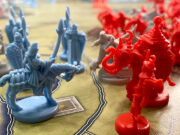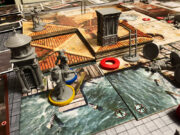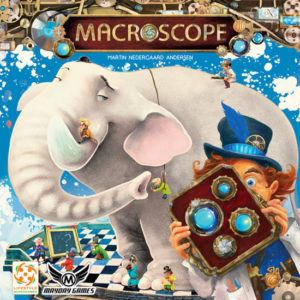 Games that require an outside knowledge or skill to be successful are ultimately hit or miss for players. If you are not packed full of useless information or are an awful drawer, like me, your enjoyment of a certain game can be limited. While I love guessing what others were drawing in Pictionary or Telestrations, the drawing element was stress inducing.
Games that require an outside knowledge or skill to be successful are ultimately hit or miss for players. If you are not packed full of useless information or are an awful drawer, like me, your enjoyment of a certain game can be limited. While I love guessing what others were drawing in Pictionary or Telestrations, the drawing element was stress inducing.
Luckily for me, Macroscope is a game that allows you to guess at partial images without the pesky drawing involved. During each round, players will expose parts of the picture and name the image before the other players. Not exactly a groundbreaking idea or mechanic, but let’s get into the review to see if this game is picture perfect for your collection.
Macroscope is a guessing game for 2-6 players which is completed in around 30 minutes. In my experience, the game plays best with 2-4 players.
Game Overview:
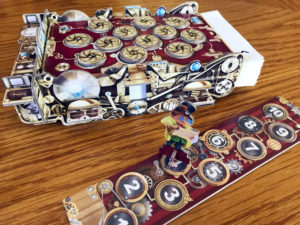
The main component of the game is the Macroscope which acts as both the cardholder and imagine cover. On top are removable tokens that players will remove a few at a time to give you a peek at the image. The game offers two distinct ways to play.
One mode gives the players crystals at the start of the game to use as betting counters. A player rolls both dice and for each die result, you remove one token from the matching number from the Macroscope. At this point, any player may make a guess. The number of tokens still on the Macroscope determines the amount the players can win or lose with their guess. Other players can challenge the guessing player if they think their answer is incorrect. You then replace the tokens and pull out the top card to see what the picture is. These crystals serve as victory points at the end of the game and the player with the most after 10 rounds wins!
The second mode doesn’t use crystals at all. Each player removes one token per turn. At any time, players can choose to make a guess by writing it on a piece of paper provided. Players write down how many closed windows on the Macroscope to determine how many points they will earn if correct. The player that guesses the earliest and correctly scores a number of victory points. All other correct answers score one point with incorrect scoring nothing. The player with the most points at the end of ten rounds wins!
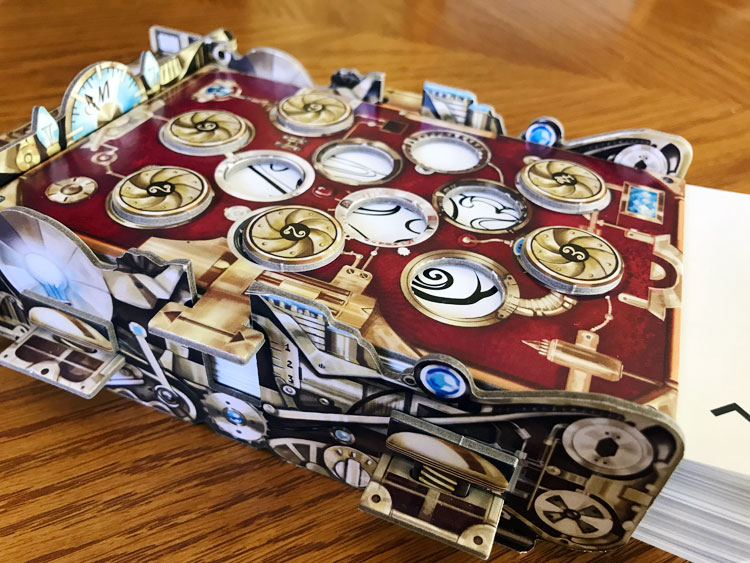
Game Experience:
I wasn’t sure how I would like Macroscope. I’m a person who likes to make interesting decisions throughout a game and the game is, at its core, just a guessing game. I was worried that the game wouldn’t hold my interest and while my hunch proved to be partially correct, the presentation of the game makes up for those shortcomings.
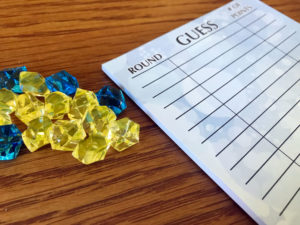
In order to do this type of game within a board game, you have to figure some way to keep the pictures hidden. The dual use of the Macroscope as a cardholder and the revealing mechanism works remarkably well. There is a sense of discovery as you continue to remove tokens from the Macroscope and get to peek in the windows.
One thing to note is that at no point do you get to see more than 50% of the picture. This causes a lingering doubt in the players’ minds when they make a guess and creates that pit of the stomach feeling that makes the gameplay interesting. Do you wait another turn to feel more confident what the image is or do you jump early? This struggle is what kept the game interesting for both adults and kids. However, this isn’t a game I want to play for long stints at a time because there isn’t enough variability in the actions each turn to keep me engaged.
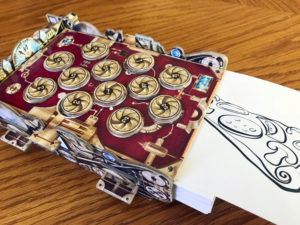
The game does come with plenty of cards for you to play and with a clear difficulty spike depending on which side you use. If you are playing this game with adults, I suggest switching over to the harder size. They are more unique images and add more doubt to the equation. We made a handicap when playing with kids on the easier side by adults only earning half the points and this made the game much more competitive.
I do prefer the family variant of the game that doesn’t use crystals over the other. The whole betting aspect doesn’t work for me in the game. I didn’t have many times where I disagreed with the guesser of the image. The use of the crystals and betting feels like an attempt to shoehorn a more competitive element to the game and it just doesn’t work.
Final Thoughts:
Macroscope works best as a family game rather than a game that you bring to a game night. The game has a great reveal mechanism of slowly showing you the imaging without giving it all away. The images are diverse, interesting, and force you to stretch your visual interpretive skills. However, Macroscope won’t hold your interest more than 10 or so rounds. There is only so much picture guessing you can do before it feels repetitive. Despite that, the experience is still a solid one and I recommend the game for anyone who wants something a little different when it comes to guessing games or has children 5 and up.
Final Score: 3 Stars – A unique spin on picture guessing game that is better for casual gamers or children.
 Hits:
Hits:
• Great game for families
• Nice difficulty spike with images
• Practical and functional revealing mechanism
Misses:
• Only good for short experiences
• Betting rule set isn’t enjoyable




